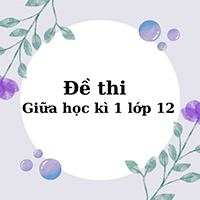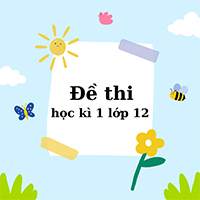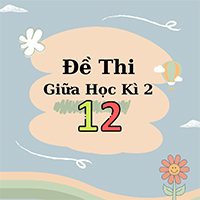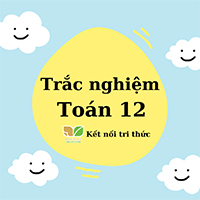Giải SGK Unit 2 lớp 12 Cultural Diversity Listening Speaking
Nằm trong bộ đề Giải bài tập SGK Tiếng Anh lớp 12 theo từng Unit, giải Unit 2 Cultural Diversity tiếng Anh lớp 12: Listening - Speaking sẽ giúp học sinh chuẩn bị bài ở nhà để vào lớp tiếp thu bài tốt hơn, và là tài liệu để giáo viên và phụ huynh tham khảm trong quá trình hướng dẫn và giảng dạy tiếng Anh lớp 12 hệ 7 năm theo từng lesson hiệu quả.
* Xem thêm Học Unit 2 SGK tiếng Anh lớp 12 tại:
Soạn Unit 2 lớp 12 Cultural Diversity hệ 7 năm
Giải SGK tiếng Anh 12 Unit 2 Cultural Diversity
I. Speaking Unit 2 tiếng Anh 12 Cultural diversity trang 22 23 SGK
Task 1: Work in pairs. Express your point of view upon the following ideas, using the words or expressions in the box. (Làm việc từng đôi. Trình bày quan điểm của em về những ý tưởng sau, dùng những từ hay cụm từ trong khung.)
1. A. I think it's a good idea to have three or four generations living together under one roof. They can help one another a lot.
B. I don't agree. It's been said there's a "generation Hap" between the old and the young. Therefore, there may usually be conflicts among family members. In some countries, specially in developing countries, old-aged people like to live in a nursing homes, where they can lead independent lives.
2. C. In my opinion, it's obvious a happy marriage should he based on love, the true love, because love is the prerequisite for the family happiness. Only the true love can bring about forgiveness and sacrifice.
D. That's true. It's love that joins a man with a woman together.
3. E. I don't think it's a good idea that love can be supposed to follow the marriage. It's an obsolete thought. Everyone should have a right to make decisions for his / her own, especially the one relating to his /her personal life. In the other hand, he / she determines and chooses his / her spouse freely. We love something whenever we know and understand it well. The more we know (something), the more we like (it).
F. That's my thought, too. A happy marriage should he built on love.
4. G. I think it's OK. Holding one's hands is a way to express one's feelings or love, especially the intimacy.
H. I agree with you. How about kissing each other in public?
G. Personally, it's not our traditional culture. Our personal feelings may not be performed in public. I mean in front of other people, except for appropriate or necessary circumstances.
Hướng dẫn dịch
1. A. Tôi nghĩ rằng việc có ba hoặc bốn thế hệ cùng chung sống dưới một mái nhà là điều nên làm. Họ có thể giúp đỡ nhau rất nhiều.
B. Tôi không đồng ý. Người ta nói rằng có một "Hap thế hệ" giữa người già và người trẻ. Vì vậy, thường có thể xảy ra xung đột giữa các thành viên trong gia đình. Ở một số nước, đặc biệt là ở các nước đang phát triển, người già thích sống trong viện dưỡng lão, nơi họ có thể sống độc lập.
2. C. Theo tôi, rõ ràng một cuộc hôn nhân hạnh phúc phải dựa trên tình yêu, tình yêu chân chính, vì tình yêu là điều kiện tiên quyết để có được hạnh phúc gia đình. Chỉ có tình yêu đích thực mới có thể mang lại sự tha thứ và hy sinh.
D. Đúng là như vậy. Đó là tình yêu gắn kết một người đàn ông với một người phụ nữ với nhau.
3. E. Tôi không nghĩ rằng tình yêu có thể theo sau hôn nhân là một ý kiến hay. Đó là một suy nghĩ lỗi thời. Mọi người nên có quyền đưa ra quyết định cho riêng mình, đặc biệt là những quyết định liên quan đến cuộc sống cá nhân của mình. Mặt khác, anh ấy / cô ấy xác định và lựa chọn người phối ngẫu của mình một cách tự do. Chúng ta yêu thích điều gì đó bất cứ khi nào chúng ta biết và hiểu rõ về nó. Chúng ta càng biết nhiều (điều gì đó), chúng ta càng thích (nó).
F. Đó cũng là suy nghĩ của tôi. Anh ấy nên xây dựng một cuộc hôn nhân hạnh phúc dựa trên tình yêu.
4. G. Tôi nghĩ rằng nó ổn. Nắm tay là một cách để thể hiện tình cảm hay tình yêu của một người, đặc biệt là sự thân thiết.
H. Tôi đồng ý với bạn. Hôn nhau ở nơi công cộng thì sao?
G. Cá nhân tôi, đó không phải là văn hóa truyền thống của chúng tôi. Cảm xúc cá nhân của chúng tôi có thể không được trình diễn ở nơi công cộng. Ý tôi là trước mặt người khác, trừ những trường hợp thích hợp hoặc cần thiết.
Task 2: Below arc some typical features of the American culture. Work in pairs. Discuss and find out the corresponding features of the Vietnamese culture. (Dưới đây là một vài điểm đặc trưng của Văn hóa Mĩ. Làm việc từng đôi, thảo luận và tìm những đặc điểm tương ứng của văn hóa Việt Nam.)
American
* Two generations (parents and children) live in a home.
* Old-aged parents live in nursing homes.
* It is not polite lo ask questions about age, marriage and income.
* Americans can greet anyone in the family first.
* Groceries are bought once a week.
* Christmas and New Year holidays are the most important.
* Americans celebrate birthdays and give presents at birthday parties.
* Children sleep in their own rooms.
Vietnamese
* Two or more generations can live in a home.
* Old-aged parents often live with their children.
* Usually the inferior must greet the superior first.
* Groceries can be bought at any time when necessary.
* Only New Year (Lunar New Year-Tet) holidays are the most important.
* Now this custom is also done in Vietnamese families, but usually in rich or young ones. Most Vietnamese people celebrate parents' or grandparents' death anniversary.
* Small children usually sleep with their parents, but older children sleep in their own room.
Hướng dẫn dịch
Tại Mỹ
* Hai thế hệ (cha mẹ và con cái) sống chung trong một mái nhà.
* Cha mẹ già yếu sống trong viện dưỡng lão.
* Không lịch sự lo hỏi về tuổi tác, hôn nhân và thu nhập.
* Người Mỹ có thể chào hỏi bất cứ ai trong gia đình trước.
* Hàng tạp hóa được mua mỗi tuần một lần.
* Lễ Giáng sinh và Tết Dương lịch là quan trọng nhất.
* Người Mỹ tổ chức sinh nhật và tặng quà trong các bữa tiệc sinh nhật.
* Trẻ em ngủ phòng riêng.
Tại Việt Nam
* Hai hoặc nhiều thế hệ có thể sống trong một nhà.
* Cha mẹ tuổi già thường sống với con cái.
* Thông thường người trẻ tuổi phải chào người lớn tuổi trước.
* Có thể mua hàng tạp hóa bất cứ lúc nào khi cần thiết.
* Chỉ những ngày Tết (Tết Nguyên đán-Tết) là quan trọng nhất.
* Hiện nay phong tục này cũng được thực hiện trong các gia đình Việt Nam, nhưng thường là những người giàu có hoặc trẻ tuổi. Hầu hết người Việt Nam đều tổ chức lễ giỗ ông bà cha mẹ.
* Trẻ nhỏ thường ngủ với bố mẹ, nhưng trẻ lớn ngủ phòng riêng.
Task 3: Work in groups. Talk about the similarities and differences between Vietnamese and American cultures, using the features discussed in Task 1. (Làm việc từng nhóm. Thảo luận những điểm tương tự và khác biệt giữa văn hóa Việt Nam và văn hóa Mĩ, dùng những đặc điềm được thảo luận ờ Task 1.)
Xem thêm: Talk about the similarities and differences between Vietnamese and American cultures
A. I think there are various differences between Vietnamese and American cultures.
B. For example ?
C. Well. In the United States, usually only two generations (parents and children) live under one roof. Meanwhile in Viet Nam you can see three or more generations living in the same home.
D. A different feature between two cultures is old-aged Americans often live in nursing homes, but Vietnamese old people usually live with their children or grandchildren.
A. In America, asking about age, salary and religion is considered impolite, but it's OK or acceptable in Viet Nam. This custom, however, is also kept by some Vietnamese people, especially among young city dwellers.
B. About greetings, in the US anyone can greet the others in the family first, but in Viet Nam young or inferior people must greet the old or superior first.
C. Christmas and New Year are the most important holidays in America, but in Viet Nam only Lunar New Year is the most important.
D. Americans usually buy groceries or go shopping at weekends, but Vietnamese people can buy groceries or things at any time they need or want. I think it depends on lifestyle and family activities.
A. About the ways of expressing love or sentiments, Americans can kiss or embrace each other in public, but this is considered unpleasant to eyes in Viet Nam.
B. Birthdays or wedding anniversaries are usually celebrated in American families; they are considered important family celebrations. In Viet Nam we also see this custom, but only in young or rich families.
C. One more difference in two cultures: American children sleep in their own rooms, meanwhile Vietnamese parents let their children sleep with them, especially small children.
II. Listening Unit 2 tiếng Anh 12 Cultural diversity trang 24 25 SGK
❖ Before You Listen Trước khi nghe
Work with a partner. Discuss the following questions. (Làm việc với một bạn cùng học. Thảo luận những câu hỏi sau.)
1. Have you ever attended a wedding ceremony?
2. What do the bride and the groom usually do at the wedding ceremony?
Gợi ý
1. Yes. I often have.
2. The bride and the groom usually stand in front of their ancestors' altar praying and asking them to bless their love and they wear rings and other jewelry to each other. Afterwards, the bride's and the groom's parents and relatives give them presents or jewels. Then the bride and the groom come over to present themselves to their grandparents, families' members and relatives. At the end, they have a party either at home or at a restaurant.
❖ While You Listen Trong khi nghe
Click để nghe
Task 1: Listen to the passage and fill in the missing information. (Nghe đoạn văn và điền những thông tin thiếu.)
1. the groom's parents. 2. red paper 3. family or ancestors' altar
at the wedding banquet. 5. money gifts
❖ Tapescript
WEDDING in VIET NAM
Tourist : T Tourist Guide: TG
T : Can you tell me something about the wedding ceremony in Vietnam?
T.G : Well, wedding is very important to the Vietnamese, not only to the couple involved but also for both families. The wedding day is usually chosen by the groom's parents.
T : What does the groom's family do on the wedding day?
T.G.: On the wedding day, the groom's family and relatives go to the bride's house bringing gifts wrapped in red papers. Those who hold the trays of gifts are also carefully chosen.
T.: Do you have the Master of Ceremonies? And what does he do during ihe wedding ceremony?
T.G.: The Master of Ceremonies introduces the groom, the bride, the parents, the relatives and guests of the two families. The wedding ceremony starts in front of the altar. The bride and the groom would pray, asking their ancestors' permission to be married. The Master of Ceremonies would give the wedding couple advice on starting a new family. The groom and the bride then exchange their wedding rings.
T.: Where is the wedding banquet held?
T.G.: Well, it depends. Often the wedding banquet is scheduled at the groom or bride's home or at a restaurant and all close relatives, friends and neighbours are invited.
T. What kind of food and drinks are served? Traditional food and beer or wine are. During the reception, the groom and bride and their parents stop by each table to thank their guests. The guests, in return, will give envelopes containing wedding cards and money gifts to the newly wedded couples alone with their blessings.
T.: Oh. That's very interesting. Thank you.
T.G.: You're welcome.
Task 2: Listen again and answer the questions. (Nghe lại và trả lời các câu hỏi.)
Đáp án
1. The most important thing the groom's family has to do on the wedding day is to go the bride's house bringing gifts wrapped in red paper.
2. They would pray and ask their ancestors to bless their love in from of the family's altar.
3. After they pray to their ancestors .
4. The wedding banquet is usually held either at the groom's and bride's home or at a restaurant.
5. They come up to each table to thank their guests.
❖ After You Listen Sau khi nghe
Work in groups. Discuss the questions, "What do families often do to prepare for a wedding ceremony?" (Làm việc từng nhóm. Thảo luận câu hỏi. "Các gia đình thường làm gì để chuẩn bị lễ cưới'')
A. The wedding ceremony is a very important occasion to every Vietnamese family."
B. Sure it is. It's one of the most important of the Vietnamese traditional ceremonies. Therefore it must he well prepared.
C. There's no doubt about it. Then, what do related families do for it?
D. I think the ceremony must he prepared tor weeks before the scheduled day.
A. What should they do?
B. Well. As I know, both families must decorate their houses, especially the family altars. All things must be clean or new, and gorgeous!
C. Next they send letters of invitation to relatives, friends and neighbours, usually ten days before. To the people who live nearby, they must come to invite them in person.
A. Simultaneously, they have to make a reservation at a restaurant for the wedding reception, or do all things necessary for it.
C. And the most important thing the groom's parents must do is they must prepare all things, for example jewels, money, presents, for the wedding day.
D. Besides, the groom's parents should choose the people who will accompany the groom - bringing the trays of gifts - to go to the bride's house.
Trên đây là Giải Unit 2 Listening Speaking SGK tiếng Anh 12 hệ 7 năm. Mời bạn đọc tham khảo thêm nhiều tài liệu ôn tập Tiếng Anh 12 khác như: Để học tốt Tiếng Anh lớp 12, Bài tập Tiếng Anh lớp 12 theo từng Unit trực tuyến, Đề thi học kì 1 lớp 12, Đề thi học kì 2 lớp 12,... được cập nhật liên tục trên VnDoc.com.
Mời quý thầy cô, các bậc phụ huynh tham gia nhóm Facebook: Tài liệu ôn tập lớp 12 để tham khảo chi tiết các tài liệu học tập lớp 12 các môn năm 2021 - 2022.









